 THE FAMOUS Ghalib The Sound of My
THE FAMOUS Ghalib The Sound of My
Moving Pen Ralph Russell (1918-2008) has been widely recognized as the greatest western scholar of Urdu. Khushwant Singh described him as much the most revered name of interpreters of Ghalibs life and works. For over thirty years he headed the Urdu department at the School of Oriental and African Studies, University of London, and throughout his life regularly spent time in both India and Pakistan, writing, working with fellow scholars and as a popular lecturer. After his retirement he pioneered the teaching of Urdu to English speakers in communities across the UK, to encourage greater mutual understanding between people of different backgrounds. His unusual skill as a translator and his insightful writing have opened up an appreciation of Urdu literature to a wide range of readers. Also by Ralph Russell The Oxford India GhalibGhalib: Life and letters (with Khurshidul Islam) Ghalib, the poet and his ageThree Mughal Poets: Mir, Sauda, Mir Hasan (with Khurshidul Islam) The Pursuit of Urdu Literature: A Select HistoryAn Anthology of Urdu LiteratureHow not to write the History of Urdu literature Autobiography: Vol 1: Findings Keepings (1918-1946) Vol 2: Losses Gains (1945-1958) In appreciation of Ralph Russells writing on Urdu literature Easily the best Urdu scholar in the West.
Shamsur Rahman Farouqi, Allahabad A superb translator the best introductory book to put in the hands of any student interested in Urdu poetry. C.M. Naim, University of Chicago A masterly introduction to the Urdu languages greatest poet. Bhupinder Singh, Sunday Tribune Those uninitiated in the tradition of ghazals will find this immensely enjoyable. Shams Afif Siddiqi, The Telegraph A veritable feast for connoisseurs of poetry and students of literature alike. A.J.
Thomas, Deccan Herald Urdu literature has gained immensely from his perspective of an outsider not born to the language. Mohammed Asaduddin, Jamia Millia Islamia, Delhi No one in the West today speaks with such authority about Urdu or is better able to communicate its pleasures to those who do not read the language. Francis Robinson, Times Literary Supplement, London ROLI BOOKS This digital edition published in 2016 First published in 2016 by The Lotus Collection An Imprint of Roli Books Pvt. Ltd M-75, Greater Kailash- II Market New Delhi 110 048 Phone: ++91 (011) 40682000 Email: Website: www.rolibooks.com Copyright The literary estate of Ralph Russell All rights reserved. No part of this publication may be reproduced, transmitted, or stored in a retrieval system, in any form or by any means, whether electronic, mechanical, print reproduction, recording or otherwise, without the prior permission of Roli Books. eISBN: 978-93-5194-121-7 All rights reserved. eISBN: 978-93-5194-121-7 All rights reserved.
This e-book is sold subject to the condition that it shall not, by way of trade or otherwise, be lent, resold, hired out, or otherwise circulated, without the publisher's prior consent, in any form or cover other than that in which it is published. THE FAMOUS Ghalib The Sound of My
Moving Pen GHAZALS SELECTED AND EXPLAINED BY Ralph Russell  REVISED EDITION Marion Molteno
REVISED EDITION Marion Molteno 
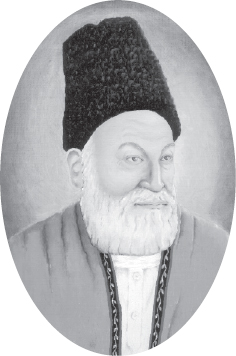 These themes I write of come into my mind from the unseen Ghalib, the sound my moving pen makes is an angels voice Contents Foreword T his book is for anyone who has heard that Ghalib is a great poet and wants to find out why his poetry has inspired generations of Urdu speakers and many others besides. You may have tried reading some of it in translation but found it didnt make much sense to you. Or you may have listened to his ghazals being sung and wished you could understand more but if you cannot read the Urdu script its difficult to get further on your own. Whatever your starting point, Ralph Russells insightful writing and translations will make it possible for you to get to know Ghalibs poetry, and open up to you a store of delight. Part 2: Selections from Ghalibs ghazals gives over 200 couplets in Ralph Russells translations, alongside the original Urdu and not just in Urdu script, but also transcribed using both English and Hindi scripts. Part 2: Selections from Ghalibs ghazals gives over 200 couplets in Ralph Russells translations, alongside the original Urdu and not just in Urdu script, but also transcribed using both English and Hindi scripts.
These themes I write of come into my mind from the unseen Ghalib, the sound my moving pen makes is an angels voice Contents Foreword T his book is for anyone who has heard that Ghalib is a great poet and wants to find out why his poetry has inspired generations of Urdu speakers and many others besides. You may have tried reading some of it in translation but found it didnt make much sense to you. Or you may have listened to his ghazals being sung and wished you could understand more but if you cannot read the Urdu script its difficult to get further on your own. Whatever your starting point, Ralph Russells insightful writing and translations will make it possible for you to get to know Ghalibs poetry, and open up to you a store of delight. Part 2: Selections from Ghalibs ghazals gives over 200 couplets in Ralph Russells translations, alongside the original Urdu and not just in Urdu script, but also transcribed using both English and Hindi scripts. Part 2: Selections from Ghalibs ghazals gives over 200 couplets in Ralph Russells translations, alongside the original Urdu and not just in Urdu script, but also transcribed using both English and Hindi scripts.
If you know no Urdu, you can just read the translations. If you know Hindi or understand even a basic level of spoken Urdu, this unique feature will help you get as close to Ghalibs original poetry as your language knowledge allows. How to use this book I suggest you start by reading Part 1. The form of poetry in which Ghalib wrote the ghazal comes from a centuries-old tradition and his thoughts and feelings are expressed in its terms. Even in the best translations you may miss the point of what he is saying unless you know something of that tradition. Every significant point in Part 1 is illustrated with examples from Ghalibs ghazals, so as you read you will also be getting to know the poetry but in a context that makes its meaning clear.
Even if you are from an Urdu-speaking background and have heard ghazals recited all your life, you will still find this introduction will help you make sense of things you didnt understand before. Poetry books are to be dipped into and you may prefer to go straight to the poetry, turning the pages and seeing what catches your eye. Where you come across verses that puzzle you, go back and read Part 1 and when you have done so you will be able to return to those same verses and understand them in a new way. Reading Ghalibs own words For those who know Hindi or spoken Urdu there is an added pleasure in store, in getting nearer to Ghalibs original words. Some verses you will immediately understand for they are expressed in everyday words that are common to Urdu and Hindi. Others will seem to be composed almost entirely of words you dont know, for Urdu has a rich poetic vocabulary.
But by comparing the transcribed verse with the translation you can begin to puzzle it out, and the Poetic vocabulary has been added to help you. Many words carry symbolic meaning. Part 1 will start you off with a general understanding of this symbolism, and as you work through the couplets you will begin to recognize more of these. The ideas behind the words will begin to weave together and each couplet will create its own succinct spell of meaning. For all readers, the Index of verses will help you find a verse if you can remember how it starts. If it was mentioned in Part 1, the English index will also take you back there to give you a context.
The selections of poetry in Part 2 are arranged in the traditional ghazal order, that is, alphabetically by the last letter in the rhyme. The numbers in the Urdu index will help you locate the whole ghazal in any published collection.  What makes this book different from any other introduction to Ghalibs poetry is the unusual qualities of the author, Ralph Russell. Those who have grown up with Urdu poetry take its form and cultural content for granted and seeing no difficulties, they cannot easily help newcomers through them. Ralph Russells response to Urdu poetry was deep and personal but he did not forget how puzzling it had seemed to him at first, and he drew on this experience to find ways to help others over those initial barriers. His readers often say that when they read his books they feel they are listening to him talk, as he explains just what they need to know.
What makes this book different from any other introduction to Ghalibs poetry is the unusual qualities of the author, Ralph Russell. Those who have grown up with Urdu poetry take its form and cultural content for granted and seeing no difficulties, they cannot easily help newcomers through them. Ralph Russells response to Urdu poetry was deep and personal but he did not forget how puzzling it had seemed to him at first, and he drew on this experience to find ways to help others over those initial barriers. His readers often say that when they read his books they feel they are listening to him talk, as he explains just what they need to know.
Next page
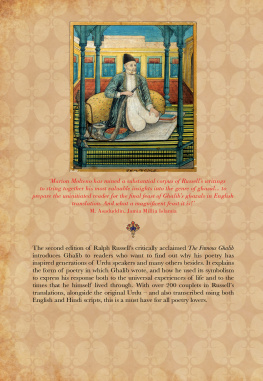

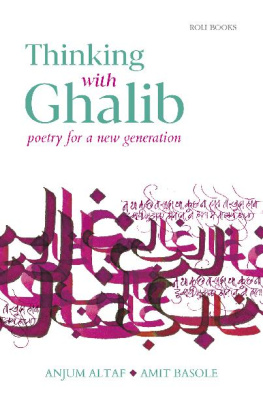
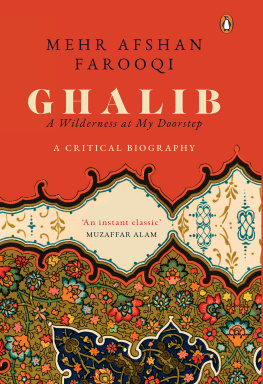
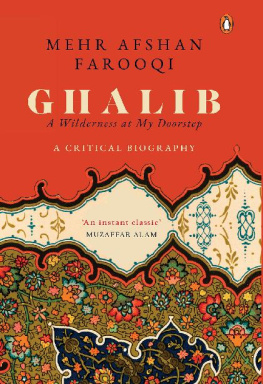
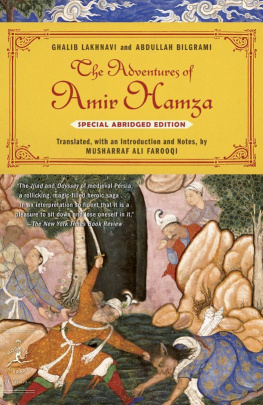
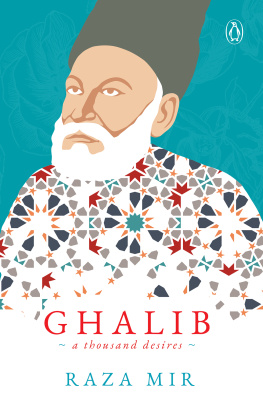
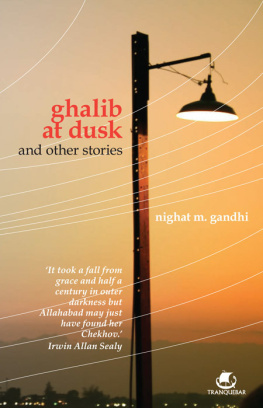
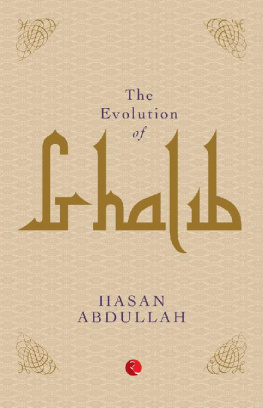
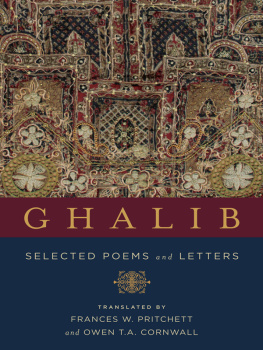
 THE FAMOUS Ghalib The Sound of My
THE FAMOUS Ghalib The Sound of My REVISED EDITION Marion Molteno
REVISED EDITION Marion Molteno 
 These themes I write of come into my mind from the unseen Ghalib, the sound my moving pen makes is an angels voice Contents Foreword T his book is for anyone who has heard that Ghalib is a great poet and wants to find out why his poetry has inspired generations of Urdu speakers and many others besides. You may have tried reading some of it in translation but found it didnt make much sense to you. Or you may have listened to his ghazals being sung and wished you could understand more but if you cannot read the Urdu script its difficult to get further on your own. Whatever your starting point, Ralph Russells insightful writing and translations will make it possible for you to get to know Ghalibs poetry, and open up to you a store of delight. Part 2: Selections from Ghalibs ghazals gives over 200 couplets in Ralph Russells translations, alongside the original Urdu and not just in Urdu script, but also transcribed using both English and Hindi scripts. Part 2: Selections from Ghalibs ghazals gives over 200 couplets in Ralph Russells translations, alongside the original Urdu and not just in Urdu script, but also transcribed using both English and Hindi scripts.
These themes I write of come into my mind from the unseen Ghalib, the sound my moving pen makes is an angels voice Contents Foreword T his book is for anyone who has heard that Ghalib is a great poet and wants to find out why his poetry has inspired generations of Urdu speakers and many others besides. You may have tried reading some of it in translation but found it didnt make much sense to you. Or you may have listened to his ghazals being sung and wished you could understand more but if you cannot read the Urdu script its difficult to get further on your own. Whatever your starting point, Ralph Russells insightful writing and translations will make it possible for you to get to know Ghalibs poetry, and open up to you a store of delight. Part 2: Selections from Ghalibs ghazals gives over 200 couplets in Ralph Russells translations, alongside the original Urdu and not just in Urdu script, but also transcribed using both English and Hindi scripts. Part 2: Selections from Ghalibs ghazals gives over 200 couplets in Ralph Russells translations, alongside the original Urdu and not just in Urdu script, but also transcribed using both English and Hindi scripts. What makes this book different from any other introduction to Ghalibs poetry is the unusual qualities of the author, Ralph Russell. Those who have grown up with Urdu poetry take its form and cultural content for granted and seeing no difficulties, they cannot easily help newcomers through them. Ralph Russells response to Urdu poetry was deep and personal but he did not forget how puzzling it had seemed to him at first, and he drew on this experience to find ways to help others over those initial barriers. His readers often say that when they read his books they feel they are listening to him talk, as he explains just what they need to know.
What makes this book different from any other introduction to Ghalibs poetry is the unusual qualities of the author, Ralph Russell. Those who have grown up with Urdu poetry take its form and cultural content for granted and seeing no difficulties, they cannot easily help newcomers through them. Ralph Russells response to Urdu poetry was deep and personal but he did not forget how puzzling it had seemed to him at first, and he drew on this experience to find ways to help others over those initial barriers. His readers often say that when they read his books they feel they are listening to him talk, as he explains just what they need to know.